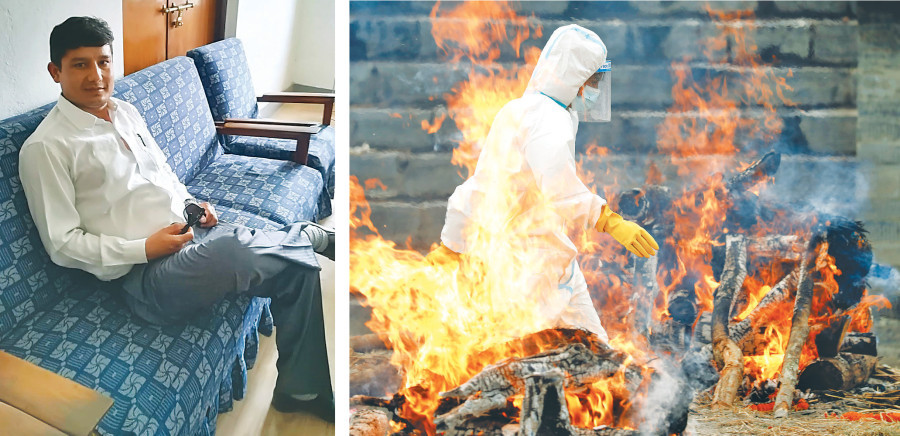Valley
Chief coordinator of Pashupati crematorium says he had never seen so many bodies
Subash Karki and his staff of 35 have been cremating bodies of Covid-19 victims day and night.
Anup Ojha
Subash Karki had never seen over 100 bodies at one place in a day, let alone managed them. But on Tuesday he oversaw the cremation of 110 bodies, all of them victims of Covid-19.
“We burned 110 bodies all through the night,” said Karki, who was appointed chief coordinator of the electric crematorium run by the Pashupati Area Development Trust a year ago. “Our machine No 1 is defunct and the other one can’t burn all the bodies as it’s old.”
Since the trust installed the electric crematorium in January 2016, an average of 15 bodies would normally get cremated in its furnaces in a day.
Unable to cremate all the bodies brought to the facility in the machine, the trust has been using 16 new platforms set up on the banks of Bagmati River and 35 in the open space inside the electric crematorium’s compound to burn bodies on wooden pyres.
For the past two weeks, Karki has been overworked, having to cremate an overwhelming number of bodies that are brought to the facility.
Karki said he is discussing with the Trust about expanding the cremation ground.
“Previously, we received a maximum of 80 bodies, and it was 110 on Tuesday. We have only 35 staffers to burn them. We are also getting help from the Nepal Army,” said Karki. “If the flow of bodies increases at the same pace, there might be a shortage of wood to burn them.”
Nearly 300 kg wood is needed to cremate a body on a pyre which costs around Rs10,000. The electric crematorium only burns an average of 18 bodies in a day, meaning that the remaining ones need to be cremated on the wooden pyres.
Nepal recorded 168 deaths with 9,238 new infections on Wednesday.
The Kathmandu Valley recorded 3,924 new infections in the past 24 hours.
Ever since the first Covid-19 death was reported in the country last year, the government had assigned the Trust to burn the bodies of Covid-19 victims only in the electric crematorium and with the help of the Army.
“It's the Nepal Army that brings the bodies and handles them but once they are placed on the pyre, it’s our staff who burn them all,” said Karki, who oversees everything from employees' work to the logistics required to burn the bodies.
Karki, who used to stay with his eight year-old-son at Gaurighat, has sent him to live with his sister, fearing that the child might contract the coronavirus.
He says his wife, who is studying in Japan, is not happy with his job.
“She keeps on telling me to quit this job,” said Karki.
Work at the crematorium holds a lot of risk. Worse, he receives no appreciation for his service to the community.
Last year he got infected when Covid-19 was perceived as a social stigma. He recovered after spending 21 days at the Nepal APF Hospital in Balambu.
“I faced so much discrimination in those days that people would go to the other direction if they saw me from afar, even months after I had fully recovered,” said Karki.
Karki doesn’t allow people to come inside the crematorium as there is a high risk of coronavirus transmission.
“Since the body is wrapped in plastic, we don’t open it. Many relatives try to come inside but we don't let them in and they react angrily,” said Karki. He often gets calls from ministers or politicians to cremate the bodies of their relatives or the victims known to them first when there is a long queue of bodies.
When a political leader or a rich person dies, there are more than 100 people at the funeral. On Wednesday, when the body of CPN-UML leader Pashupati Chaulagain was brought for cremation, over 150 people had gathered outside the compound of the crematorium.
“I was shocked to see so many people together despite the high risk of Covid-19 infection and prohibitory orders in place,” said Karki.
Karki came to Kathmandu when he was 17, from Triyuga Municipality of Udayapur. He started a job at the Trust a year later and has been serving on a contract basis for the past 14 years.
“I am working only to serve the public,” says Karki, for the money that the trust pays him is not much, without disclosing the amount.
Karki has seen kids, teenagers and elderly victims of Covid-19, but recently when he had to deal with the body of a young Covid-19 victim, a two-year-old, he was deeply troubled.
His 52-year-old mother often calls him to return home and even his brother offers to send a vehicle to take him to their village. “But, at this time of crisis, how can I go back to my village? I’m ready to serve the people however hard it gets,” said Karki.
For the frontliner, humanity matters. And his duty is demanding. “I can’t go to sleep without burning all the bodies into ashes. Since we don’t keep any dead here, our staff work till 3 in the morning burning them in the open space,” said Karki.




 14.43°C Kathmandu
14.43°C Kathmandu.jpg)














